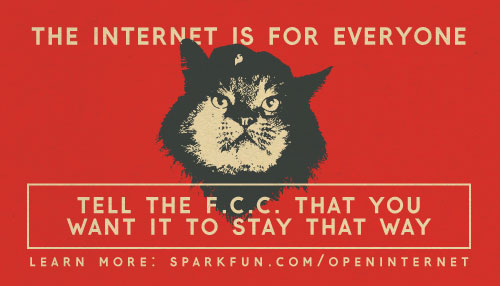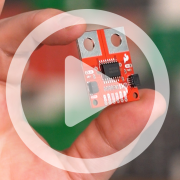FCC To Reclassify Internet as Title II Carrier
After a decade of debate and public outcry last summer, FCC Chairman Tom Wheeler issued a statement today promising to protect the open Internet.
Remember in August when we asked you to support the open Internet and gave you sweet Chat Guevara stickers? Well, rejoice friends, for we have just achieved a major victory.

Today, FCC Chairman Tom Wheeler, in a statement issued to Wired, said that his agency intends to reclassify the Internet as a Title II Common Carrier. To refresh your memory, this is a Very Good Thing. Title II protections ensure that companies deliver goods to the public without discrimination. This includes things like cab companies, public airlines, and electric and water utilities. The FCC had originally caved to pressure from telecommunication companies and classified the Internet as an "information service provider" in 2002. That brought us to today's situation, where companies like Comcast were throttling speeds and intentionally slowing down data from companies like Netflix.
It’s time to put in place rules to preserve the #OpenInternet that has become an indispensable part of our daily lives. #TitleII
— Tom Wheeler (@TomWheelerFCC) February 4, 2015
Perhaps most surprisingly, and more importantly, Chairman Wheeler intends to include wireless networks in this plan. That means that cellular networks like AT&T and Verizon can no longer do things like blocking FaceTime.
Chairman Wheeler's plan--supported by Netflix and Google, among others--will be circulated to the commissioners on Thursday, and the FCC intends to vote on it on February 26. It's clearly not a big hit with broadband companies, though, who have threatened legal battles over the rule change.
"My proposal assures the rights of internet users to go where they want, when they want, and the rights of innovators to introduce new products without asking anyone's permission."
Props to you, Chairman Wheeler. Even if a tough battle lies ahead, this is an important signal in the fight for net neutrality. Detractors claimed that government bodies like the FCC don't listen to us anyway, but with almost 4 million comments--a record for the FCC--clearly they got the message. Thank you for listening, Chairman, and we hope Congress heeds the same message.
The Internet is for everyone.








